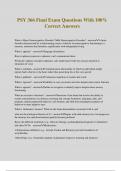PSY 366 Final Exam Questions With 100% Correct Answers What is Major Neurocognitive Disorder? Mild Neurocognitive Disorder? - answer✔✔A brain disorder characterized by a deteriorating course of deficits in neurocognitive functioning (i.e. memory, attention) that interferes significantly with independent living. What is aphasia? - answer✔✔language disturbance Broca's aphasia (expressive aphasia): can't communicate ideas Wernicke's aphasia (receptive aphasia): can't understand words but can pay attention to intonation of voice What is echolalia - answer✔✔Communication abnormality in which an individual simply repeats back what he or she hears rather than generating his or her own speech What is palilalia? - answer✔✔Continuous repetition of sounds and words What is Apraxia? - answer✔✔inability to carry out motor activities despite intact motor function What is agnosia? - answer✔✔failure to recognize or identify objects despi te intact sensory functioning What are executive functions? - answer✔✔functions of the brain that involve the ability to sustain concentration; use abstract reasoning and concept formation; anticipate, plan, and program; initiate purposeful behavior; self -monitor; and shift from maladaptive patterns of behavior to more adaptive ones. What is Alzheimer's disease? What are the brain abnormalities associated with it, and what are the etiological theories of it? - answer✔✔Begins with mild memory loss, but progr esses the memory loss and disorientation quickly become profound. Know the different treatments (e.g., behavior therapy, psyhchopharmacological) of Alzheimer's and other NCDs. - answer✔✔Medications: Cholinesterase inhibitors) e.g., Aricept, Exelon and Rem nyl), prevents breakdown of acetylcholine Other Drugs (e.g., Namenda) regulate of glutamate (improves learning and memory) Atypical antipsychotics decrease violence, hallucinations and delusions SSRIs Help with depression and anxiety In some cases drugs do not work for all patients and have only temporary effects Behavior therapies can be helpful in controlling patients' angry outbursts and emotional instability What are medical conditions that can cause NCD? - answer✔✔Lewy body disease, Parkinson's disease, human immunodeficiency virus (HIV). Huntington's' disease What are some examples of the somatic symptoms of anxiety - answer✔✔Tense muscles, increased heart rate, changes in respiration, dilated pupils, increased perspiration, adrenaline secretion, i nhibited stomach acid, decreased salivation, bladder relaxation. What are some example of emotional symptoms of anxiety? - answer✔✔Sense of dread, terror, restlessness, irritability. What are some example of behavioral symptoms of anxiety? - answer✔✔Escape , avoidance, aggression, freezing. What are some examples of cognitive symptoms of anxiety? - answer✔✔Anticipation of harm, exaggeration of danger, problems in concentrating, hypervigilance, worried/ruminative thinking, fear of losing control, fear of dyin g, sense of unreality. What is an animal type phobia? - answer✔✔focus on specific animals or insects, i.e. dogs, cats, spiders. Snakes and spiders are most common objects because it has been adaptive over evolutionary history to fear these subjects. What i s an environmental natural type phobia? - answer✔✔Focus on events or situations in the natural environment, i.e. storms/heights/water. Adaptive in that it helps us avoid danger. What is a situational type phobia? - answer✔✔involve fear of public transporta tion, bridges, elevators, flying, driving, etc. What is agoraphobia? - answer✔✔fear of places where they might have trouble escaping or getting help if they become anxious. Includes public transportation, being in shops or theaters, in crowded places, or b eing alone anywhere outside their home. What is prepared classical conditioning, and how does it help explain the development of certain phobias? - answer✔✔Theory that evolution has prepared people to be easily conditioned to fear objects or situations tha t were dangerous in ancient times. What is implosion Therapy? - answer✔✔client does not ever come to contact or see images of the stimuli, but rather desensitizes by imagining the stimuli in different situations. What is flooding therapy? - answer✔✔intensi vely expose a client to his/her feared actual/ image object until anxiety is extinguished. Therapist typically prepare clients with relaxation techniques




